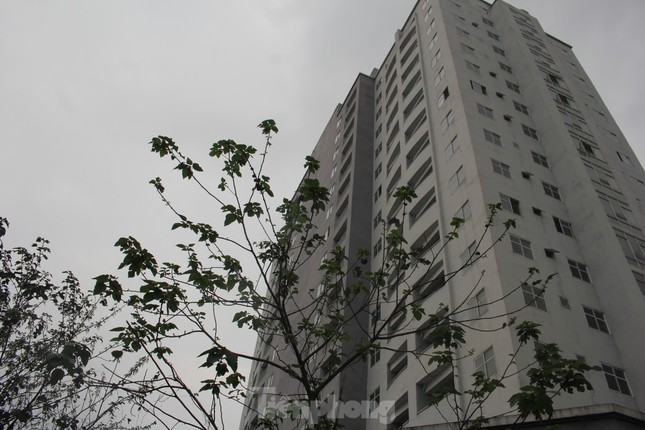VARS highlights the issue of abandoned relocation apartments in major cities like Hanoi, Ho Chi Minh City, and Danang, a phenomenon no longer uncommon. Many relocation areas have very low occupancy rates, with some buildings completely unoccupied.
Despite the massive investment of thousands of billion VND, these large-scale constructions are left vacant or underutilized, leading to severe deterioration of the entire infrastructure and related items.
Hanoi and Ho Chi Minh City alone have at least 18,000 vacant relocation apartments, costing hundreds of billion VND in maintenance and upkeep annually. According to the Hanoi People’s Committee, out of the 174 relocation housing areas in use, there are over 14,200 apartments and about 4,000 vacant ones. In some relocation projects, while residents have moved in, the commercial service areas remain empty for years without any tenants.

Abandoned relocation apartment building in Den Lu III, Hoang Mai, Hanoi.
According to statistics from the Ho Chi Minh City Department of Construction, there are over 14,000 vacant relocation apartments in the city, with the highest concentration in Binh Khanh Relocation Area (District 2) with more than 12,000 apartments and Vinh Loc B Relocation Area (Binh Chanh District) with over 2,000 apartments.
This situation contrasts with the severe shortage of apartments in the market. Since 2018, there has been a significant decline in housing supply, especially in the apartment segment. The number of approved real estate projects is limited, and ongoing projects face interruptions due to legal and capital-related issues.
VARS estimates that, on average, each special city lacks at least 50,000 apartments annually. It is illogical that tens of thousands of apartments remain vacant while many people lack housing.
During the 4th session of the XV National Assembly, the Minister of Construction, Mr. Nguyen Thanh Nghi, acknowledged that many relocation housing projects have been established but are now abandoned and no longer in demand.
Most of these projects were formed before the Law on Housing 2014. Although the Law on Housing has provisions for converting the function of relocation housing into social housing or commercial housing, it has not been feasible in practice due to procedural complexities.
To address the issue of abandoned relocation apartments, VARS suggests the need for a supervising body to closely monitor the construction process of relocation projects, ensuring strict adherence to construction standards for quality and safety.
Expediting the effectiveness of the amended Land Law and its provisions on compensation, support, and relocation to protect the rights of those whose land is revoked. Providing financial assistance programs, counseling, and vocational training to help residents adapt to their new lives. Encouraging community participation in the planning and development of relocation projects to ensure they meet practical needs and gain community consensus.
“In addition to auction houses, the state can consider combining relocation and social housing in the same segment. Relocation projects could access capital and interest rates from the VND 120,000 billion credit package to complete infrastructure, technical, and social infrastructure items, attracting residents like other housing projects,” VARS recommends.






































